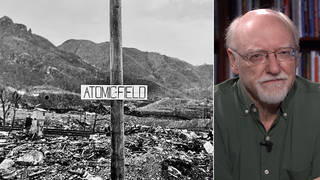
Topics
Until recently, computers were not programmed to operate with four-digit date codes, and when the year 2000 arrives, many machines may think that we have gone back to the year 1900. The implications of “Y2K” are as complex as they are uncertain. One industry that may be seriously affected is nuclear powered reactors.
Currently, there are 103 nuclear reactors operating throughout the United States. Environmental activists are concerned that the Y2K problem may cause glitches in computerized chips used in nuclear power plants, which could seriously threaten public health. So far, environmentalists say, the Nuclear Regulatory Commission has failed to require the industry to comply with Y2K contingency plans, and they charge that the desire to save money on the part of the companies is compromising public safety.
Guests:
- Paul Kawika Martin, Board Chair for Earth Culture and Special Advisor on Y2K for the Washington, D.C. Green Party and a participant of Coalition 2000, a national coalition working on the Y2K problem.
- Michael Mariotte, Executive Director of the Nuclear Information and Resource Service. Call: 202.328.0002.
Related link:











Media Options